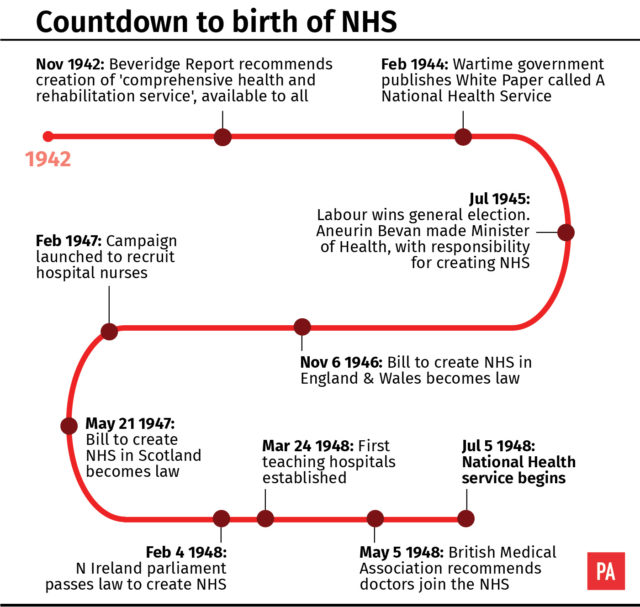
As health secretary Aneurin Bevan opened Park Hospital in Manchester in 1948, the future of healthcare in the UK changed forever.
Prior to the creation of the NHS 70 years ago, care for the masses was largely provided by voluntary organisations and charities, which left millions of people with little or no access to quality healthcare.
The new national service meant everybody could get treatment, whether they were a baker or a banker.
It was the first system of its kind in the world and people queued in the streets in the hope of getting treatment.
Seventy years on, the principles guiding the NHS remain the same, although the health landscape has radically changed.

Here are some of the key events in the history of the National Health Service:
July 5 1948: The NHS is launched by health secretary Aneurin Bevan Park Hospital in Manchester – today known as Trafford General Hospital.
The British public become entitled to a free, comprehensive healthcare funded by general taxation. At a minute past midnight the first ever baby was born on the NHS at Amman Valley Hospital in Wales. Aneira Thomas was named after the NHS’s founder, Mr Bevan.
1952: Prescription charges are launched in England. At the time they were one shilling; the cost of a prescription now is £8.80. A flat rate of £1 for ordinary dental treatment is introduced.
1958: The NHS launches a polio and diphtheria vaccinations programme.
1960: The first UK kidney transplant takes place at Edinburgh Royal Infirmary involving identical 49-year-old twins.
1961: The contraceptive pill is made available, initially only to married women.
1962: Health minister Enoch Powell introduces his Hospital Plan to set out a vision to build a hospital in each area where more than 125,000 people lived.
1968: Britain’s first heart transplant is carried out at the National Heart Hospital in Marylebone, London.
1972: CT scans revolutionise how doctors can see the body. Computerised tomography (CT) scanners produce 3D images from a large series of 2D X-rays.
1978: The world’s first IVF baby is born. Then known as a ‘test tube baby’, Louise Brown was born on July 25. Forty years later more than eight million IVF babies have been born across the world.
1980s: The NHS sees vast technological improvements from the introduction of MRI scanners and keyhole surgery.
1986: The first Aids health campaign is launched.
1987: The world’s first liver, heart and lung transplant is carried out at Papworth Hospital in Cambridge.
1988: The breast screening programme is introduced.
1994: The NHS Organ Donor Register is launched.
1998: NHS direct is launched. It has since been replaced by NHS 111 – the number people can call if they need help, if it is not a 999 emergency.
1999: Powers over the Scottish and Welsh health services are devolved.
2000: NHS walk-in centres are introduced.
2002: The first successful gene therapy is carried out at Great Ormond Street Hospital in London.
In the same year, the four hour target for A&E departments is introduced. This means that patients should be treated, admitted, discharged or transferred within four hours of arriving in the emergency room. The target is still in use and seen by many as a barometer for how the health system as a whole is coping.
2006: The NHS Bowel Cancer Screening Programme is launched.
2008: The HPV vaccination programme is launched to vaccinate girls aged 12-13 against human papilloma virus to help prevent cervical cancer.
2009: The Stroke Act FAST. campaign is launched. FAST stands for Face Arm Speech Time, and is a simple test to help people recognise the signs of stroke and to call 999 if it is suspected.
In the same year, the health watchdog the Care Quality Commission is launched.
June 15 2012: The Health and Social Care Act 2012 was first published, taking effect on April 1 2013.
That same year, a surgical team at Leeds General Infirmary carries out the UK’s first hand transplant operation.
2013: The NHS Friends and Family Test is introduced in 2013, which asks patients whether they would recommend hospital wards and A&E departments to their friends and family if they needed similar care or treatment.
2018: The year the NHS celebrates the 70th anniversary of its creation, the Government pledges an additional £20 billion for the NHS in England over five years.
Source: NHS Choices/Nuffield Trust


Comments: Our rules
We want our comments to be a lively and valuable part of our community - a place where readers can debate and engage with the most important local issues. The ability to comment on our stories is a privilege, not a right, however, and that privilege may be withdrawn if it is abused or misused.
Please report any comments that break our rules.
Read the rules here